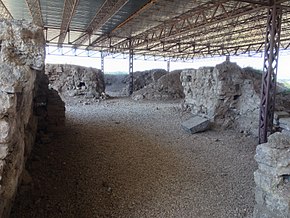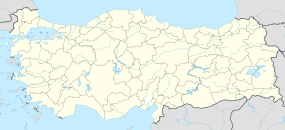Alalah
| Alalaḫ | |

Archaeological site of Alalakh (Tell Açana)
|
|
| Alternate name | Tell Atchana |
|---|---|
| Location | Hatay Province, Turkey |
| Region | Levant |
| Coordinates | 36°14′16″N 36°23′05″E / 36.23778°N 36.38472°ECoordinates: 36°14′16″N 36°23′05″E / 36.23778°N 36.38472°E |
| Type | Settlement |
| History | |
| Founded | 2nd millennium BC |
| Abandoned | 12th century BC |
| Site notes | |
| Condition | In ruins |

Fugitive slave treaty between Idrimi of Alalakh (now Tell Atchana) and Pillia of Kizzuwatna (now Cilicia)
|
|
| Size | Length: 12 cm (4.7 in) Width: 6.4 cm (2.5 in) |
|---|---|
| Writing | cuneiform |
| Created | 1480BC (about) |
| Present location | Room 54, British Museum, London |
| Identification | 131447 |
Alalakh (Hittite: Alalaḫ) was an ancient city-state, a late Bronze Age capital in the Amuq River valley of Turkey's Hatay Province. It was occupied from before 2000 BC, when the first palace was built, and likely destroyed in the 12th century BC and never reoccupied. The city contained palaces, temples, private houses and fortifications. Modern Antakya has developed near the site.
The remains of Alalakh have formed an extensive mound; the modern archaeological site is known as Tell Atchana. It was first excavated in the 1930s and 1940s by a British team. A team sponsored by the University of Chicago started surveys in the late 20th century, and has conducted excavations led by K. Aslihan Yener in the early 21st century. She is now leading work sponsored by Mustafa Kemal University and the Turkish government.
Alalakh was founded by the Amorites (in the territory of present-day Turkey) during the early Middle Bronze Age in the late 3nd millennium BC. The first palace was built c. 2000 BC, contemporary with the Third Dynasty of Ur.
The written history of the site may begin under the name Alakhtum, with tablets from Mari in the 18th century BC, when the city was part of the kingdom of Yamhad (modern Aleppo). A dossier of tablets records that King Sumu-Epuh sold the territory of Alakhtum to his son-in-law Zimri-Lim, king of Mari, retaining for himself overlordship. After the fall of Mari in 1765 BC, Alalakh seems to have come under the rule of Yamhad again. King Abba-El I of Aleppo bestowed it upon his brother Yarim-Lim, to replace the city of Irridu. Abba-El had destroyed the latter after it revolted against his brother Yarim-Lim. A dynasty of Yarim-Lim's descendents was founded, under the hegemony of Aleppo, that lasted to the 16th century. According to the short chronology found at Mari, at that time Alalakh was destroyed, most likely by Hittite king Hattusili I, in the second year of his campaigns.
...
Wikipedia

